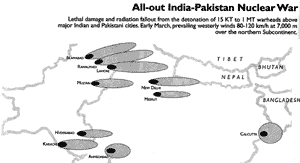 Do nuclear weapons work? As agents of mass destruction, Hiroshima and Nagasaki are a constant reminder of their effectiveness at dealing death and destruction. No, I wonder about the nuclear arsenals of India and Pakistan, and whether they haven't helped keep the peace between two angry neighbours, beset by internal tensions and pressures and, until now, largely ignored by the rest of the world.
Do nuclear weapons work? As agents of mass destruction, Hiroshima and Nagasaki are a constant reminder of their effectiveness at dealing death and destruction. No, I wonder about the nuclear arsenals of India and Pakistan, and whether they haven't helped keep the peace between two angry neighbours, beset by internal tensions and pressures and, until now, largely ignored by the rest of the world. Like many, I went ballistic at the Indian nuclear tests in May of 1998. Pakistan's follow-on was even more maddening. Here were twoTitans of Poverty pouring funds-in Pakistan's case, largely money freed up by overgenerous aid donations-into hideously dangerous weapons. They'd fought three largely pointless wars and spent the better part of six decades finding reasons to hate each other.
In mid-1998, they recklessly upped the ante hugely, endangering a region that I've come to love and live in. Now I'm not so sure. Call me shallow, or driven by events, but I wonder if the relatively small nuclear arsenals in both countries haven't helped avoid all out war, at least twice in the past two years. Whoa, I can hear the screams of outrage already, not least from my abolitionist wife who marched the 1980s away protesting against American and Soviet nuclear weapons.
But let's consider the evidence. The Kargil conflict in 1999 was widely described as South Asia on the brink of all out nuclear war. Pakistan had organised an incursion into Indian-controlled territory along the line of control, India fought back fiercely, and with a little help from Bill Clinton, saw off the threat from across the line.
Hundreds of young Indian men died retaking ridges and mountain peaks that would defy the skills of mountaineers. We'll probably never know how many from the other side were killed, but my friends in Gilgit and Skardu told me that funerals went on for days after the killing stopped.
Yet it remained a largely local skirmish. Despite immense rhetorical pressure from fire breathing desk generals of the Indian media and the bellicose middle classes of Delhi, Atal Behari Vajpayee kept his troops on his side of the LOC. An American diplomatic source told me afterward that there were credible threats from Islamabad that nuclear weapons might be used if the Indians crossed the line. That's denied in public by both India and Pakistan yet it makes some sense. And if it's true, then we must acknowledge the role of the South Asian version of mutually assured destruction-the unwritten NATO-Moscow equation that kept the peace during the Cold War.
I wonder too about the current round of Delhi-Islamabad hostilities. The usual suspects in India (media, middle classes, pundits) bray for war. Vajpayee makes all the right noises, General Musharaff regrets but talks equally tough. Meanwhile, he quietly rounds up militants while India's wily leader keeps the military preparations firmly within reversible limits. War fears fade as quickly as they flared and only the frighteningly callow commentariat in Delhi seems disappointed.
I am willing to bet both Musharaff and Vajpayee were well aware of the immense risks they were taking, and knew how far they could go before starting to tone things down. The problem lies in Pakistan's conventional inferiority to India. As a smaller, poorer country that has been subjected to an American arms embargo for more than a decade, Pakistan is simply not able to best India in conventional battle. The Pakistani armed forces are well trained, morale is high but they lack technology and numerical weight.
So asymmetrical strategies like nuclear weapons and support for cross border insurgencies are a natural part of Pakistan's arsenal. Islamabad might have little choice but to use its atomic bombs if invaded by Indian armour and infantry. But lest a flock of hawks gather round me, let me say I still hate nuclear weapons. Just because they deter war in times of rhetorical hostility doesn't mean that defusing tensions is not imperative.
And there are other, frightening issues like the absence of command and control, extremist forces in both countries, nuclear accidents and so on. It all underlines the need to move towards regional peace and the prosperity that will follow. Even Washington and Moscow eventually abandoned mutually assured destruction, known by its highly appropriate acronym, MAD. A little less madness in South Asia would do us all a world of good.



